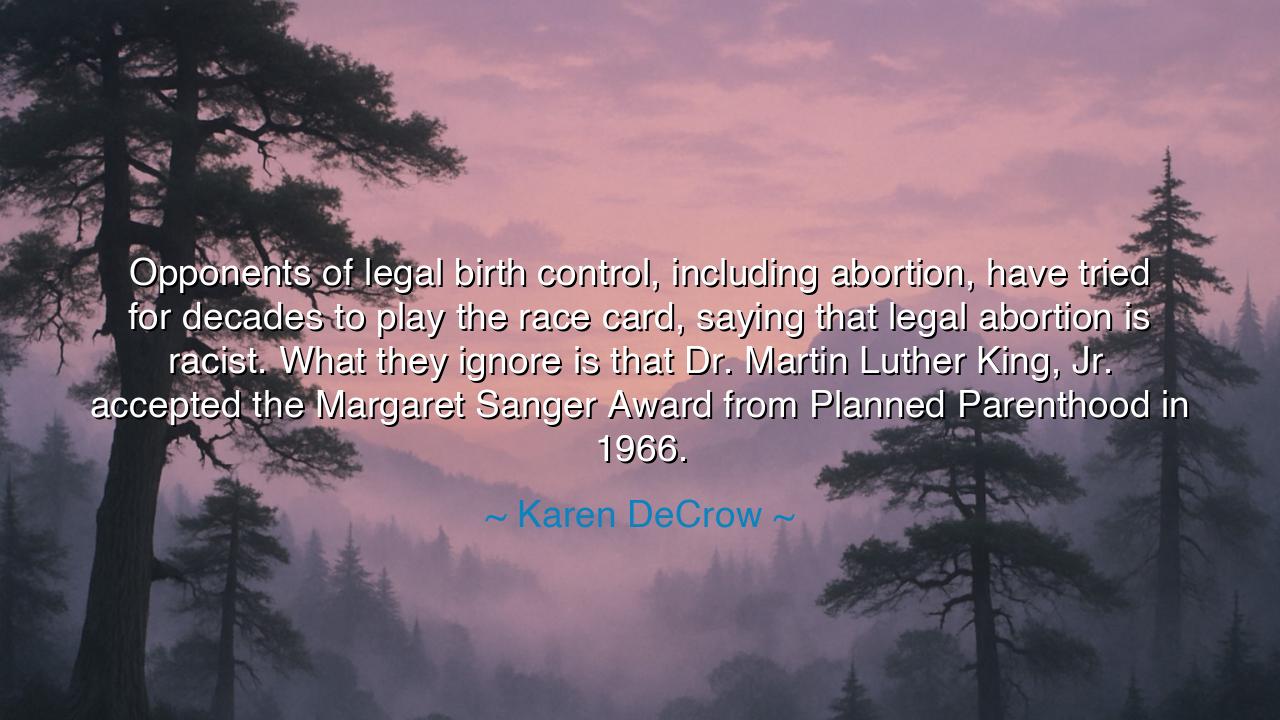
Opponents of legal birth control, including abortion, have tried
Opponents of legal birth control, including abortion, have tried for decades to play the race card, saying that legal abortion is racist. What they ignore is that Dr. Martin Luther King, Jr. accepted the Margaret Sanger Award from Planned Parenthood in 1966.






In the chronicles of social justice and human rights, few issues have stirred as much passion, debate, and moral reflection as the question of reproductive freedom. Karen DeCrow’s words, “Opponents of legal birth control, including abortion, have tried for decades to play the race card, saying that legal abortion is racist. What they ignore is that Dr. Martin Luther King, Jr. accepted the Margaret Sanger Award from Planned Parenthood in 1966,” illuminate a profound truth: principled support for reproductive rights is not inherently at odds with racial justice, and historical leaders recognized the importance of empowering individuals to make decisions over their own bodies. Here lies a meditation on truth, context, and the enduring need to separate rhetoric from principle.
From the courts of Athens to the forums of Renaissance Europe, debates over the governance of human life, freedom, and justice have always been intertwined with ethics and social responsibility. Just as philosophers wrestled with the balance between communal well-being and individual liberty, modern society grapples with the implications of birth control and abortion in the context of equality and civil rights. DeCrow’s reflection situates this age-old struggle within the 20th-century fight for reproductive freedom, emphasizing the need for clarity, historical understanding, and moral consistency.
History provides vivid illustration. In the 1960s, Dr. Martin Luther King, Jr. championed civil rights while also recognizing the broader context of social justice, which included the right to control one’s family and reproductive choices. His acceptance of the Margaret Sanger Award from Planned Parenthood in 1966 underscores the alignment between civil rights and reproductive freedom, a fact often overlooked by those seeking to manipulate racial anxieties for political ends. This historical moment illustrates that support for reproductive rights is consistent with the pursuit of justice and equality.
Consider the societal implications of denying legal birth control or abortion under the guise of racial concern. Restricting these rights does not serve the welfare of marginalized communities; instead, it limits autonomy, exacerbates poverty, and constrains opportunity. DeCrow’s words remind us that the rhetoric of opponents often obscures reality, whereas the actions of leaders like King reflect a nuanced understanding: empowerment, access, and freedom of choice are essential to justice, irrespective of race.
The philosophical resonance of this statement is profound: true social justice demands that individuals, especially women, be empowered to make decisions about their own bodies and families. Denying access under false pretenses or political manipulation undermines both liberty and equality. The ancients understood that morality requires discernment and attention to context; similarly, contemporary society must distinguish between genuine ethical concerns and manipulative arguments.
For modern citizens, the lesson is clear. Examine historical context, question rhetoric, and align advocacy with both evidence and principle. Recognize that racial justice and reproductive freedom are not mutually exclusive; rather, they intersect in the shared pursuit of human dignity, autonomy, and opportunity. Awareness of history prevents the distortion of moral truths for political gain.
Practically, this teaching calls for engagement and education. Support policies that ensure equitable access to reproductive healthcare, challenge misleading narratives, and honor the historical commitments of civil rights leaders. Empower communities with knowledge, and ensure that choices regarding family and health remain protected by law, informed by justice and compassion.
Thus, Karen DeCrow’s words endure as a timeless admonition: true justice requires both clarity and courage, separating rhetoric from principle, and protecting the rights of all individuals to make choices over their own lives. Let this reflection guide leaders, citizens, and advocates, reminding all that empowerment, equality, and historical understanding are the pillars of a just and humane society. In honoring these principles, we safeguard both liberty and the moral integrity of the generations to come.






AAdministratorAdministrator
Welcome, honored guests. Please leave a comment, we will respond soon